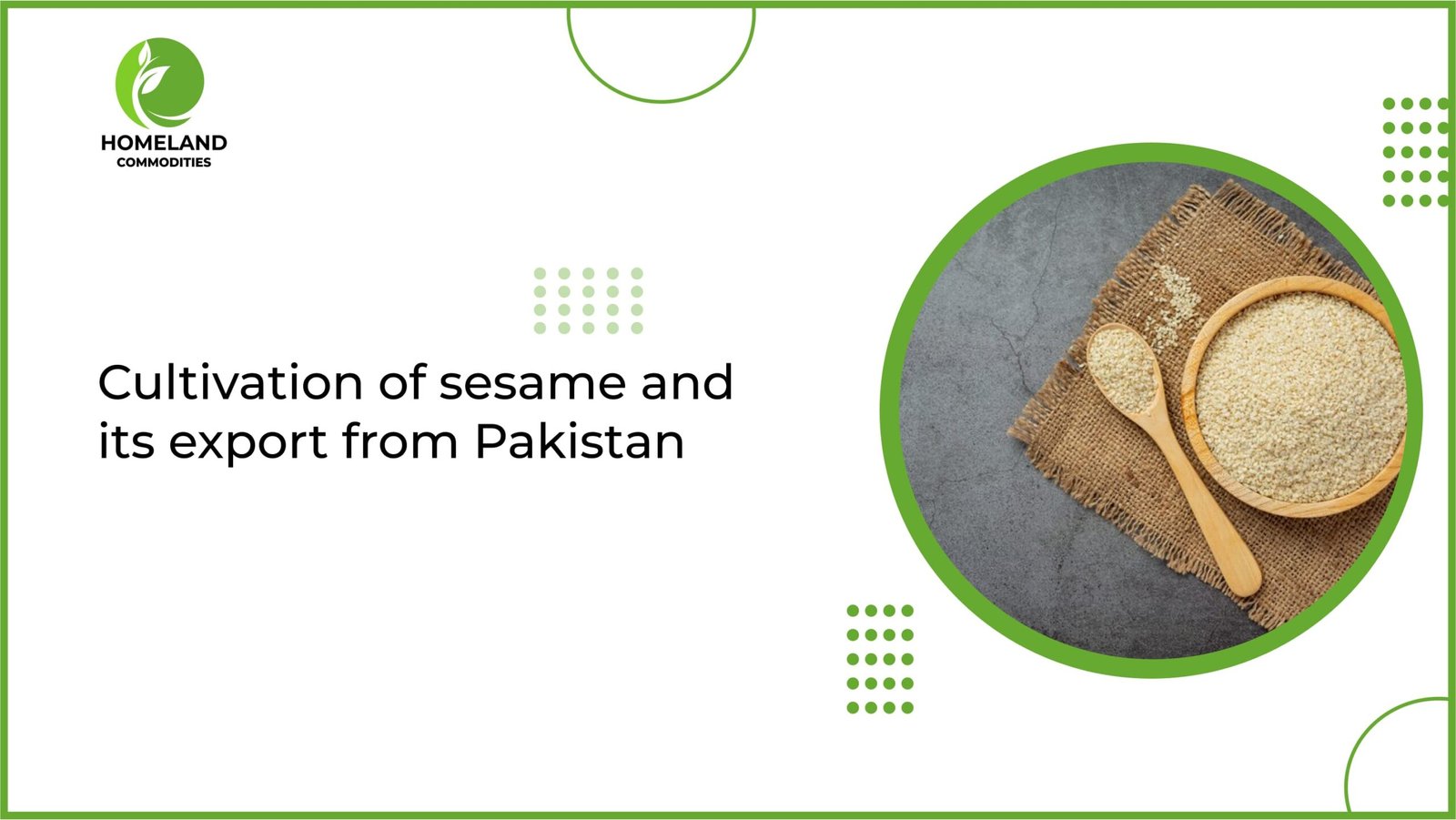Sesame (Sesamum indicum), a traditional oilseed crop, holds significant cultural and economic importance in Pakistan. Renowned for its adaptability and high oil content, sesame seeds are utilized in various industries, ranging from food to pharmaceuticals. This comprehensive article delves into the cultivation practices, regional production, recent growth trends, and the burgeoning export market of sesame seeds in Pakistan.
Historical Background and Significance
Traditional Cultivation Practices
Sesame has been cultivated in Pakistan for centuries, embedded in the agricultural practices of rural communities. Traditional farming methods, including manual sowing and harvesting, have sustained the production of sesame over the years. The crop’s resilience to drought and adaptability to different soil types have made it a reliable choice for farmers in diverse climatic conditions.
Economic Importance
The economic significance of sesame in Pakistan has escalated over the years. Initially cultivated on a modest scale, the crop has emerged as a substantial revenue generator. The versatility of sesame seeds in producing oil, food products, and industrial materials has spurred demand in both domestic and international markets.
Sesame Cultivation in Pakistan
Key Cultivation Areas
Sesame cultivation in Pakistan is concentrated in several key regions, each contributing uniquely to the overall production:
- Punjab: This province is the powerhouse of sesame production, accounting for 95% of the total output. Key districts include Gujrat, Sialkot, Gujranwala, Attock, Bhakkar, and Faisalabad. The predominant varieties grown are Farmi, Hybrid, and Black-brown.
- Sindh: Contributing 2.1% to the national production, Sindh’s sesame cultivation is primarily in Tharparkar, Dadu, and Hyderabad districts. The Mix and Desi varieties are the main types cultivated here.
- Khyber Pakhtunkhwa: Notable districts for sesame farming include Kohat and D.I. Khan.
- Baluchistan: Although contributing 2.2% to the national production, districts like Naseerabad and Lasbela have shown potential for increased sesame cultivation.
Recent Growth and Expansion
In 2018, Pakistan produced 29,000 tons of sesame seeds on 176,000 acres of land. Since then, significant efforts by federal and provincial governments have led to unprecedented growth. The cultivation area expanded to 399,493 hectares in the current season, marking a 187% increase compared to the previous year.
Government Initiatives
The Ministry of National Food Security and Research, along with provincial agriculture departments, has played a pivotal role in boosting sesame cultivation. Programs like the National Oilseeds Enhancement Program (NOEP) have facilitated significant improvements in yield and production. The average yield of sesame increased by 69%, rising from 442 to 750 kg/ha under NOEP.
Export Market Dynamics
Export Growth
Pakistan’s sesame exports have experienced remarkable growth. Starting from $89.32 million in 2020, the export value surged to $407 million in 2023. This exponential growth has positioned Pakistan as the fifth-largest exporter of sesame seeds globally, with China absorbing over 80% of its exports.
Export Value and Volume
According to the Federal Bureau of Statistics, in the 2018-19 period, 366 million tons of sesame seeds were exported, amounting to Rs. 9000 million. This growth in both value and volume underscores the increasing global demand for Pakistani sesame seeds and highlights the country’s potential in the international market.
Uses of Sesame Seeds
Sesame seeds are highly valued for their diverse applications across various industries:
- Food Industry: Sesame seeds are used in bakery products, confectionery, and as a condiment in various cuisines.
- Oil Production: Sesame oil, known for its nutritional benefits, is used in cooking, salad dressings, and as a base in several traditional dishes.
- Cosmetics and Personal Care: The oil is a key ingredient in soaps, shampoos, and skin care products due to its moisturizing and anti-inflammatory properties.
- Pharmaceuticals: Sesame oil is used in the production of various medicinal formulations and as a carrier oil for drugs.
- Industrial Uses: Sesame seeds are used in the production of carbon paper, insecticides, and other industrial products.
Potential Areas for Further Cultivation
Despite the substantial growth, there are still untapped areas with high potential for sesame cultivation:
- Punjab: Gujrat, Sialkot, Gujranwala, Attock, Bhakkar, Faisalabad
- Sindh: Tharparkar, Dadu, Hyderabad
- Khyber Pakhtunkhwa: Kohat, D.I. Khan
Challenges and Opportunities
Challenges
Despite the growth, several challenges need to be addressed to sustain and further enhance sesame cultivation and export:
- Climate Change: Unpredictable weather patterns can affect crop yields and quality.
- Pest and Disease Management: Effective pest and disease control measures are essential to prevent crop losses.
- Market Fluctuations: Price volatility in international markets can impact the profitability of sesame farming.
Opportunities
There are numerous opportunities to capitalize on the growing demand for sesame seeds:
- Research and Development: Investing in R&D to develop high-yield and disease-resistant varieties can boost production.
- Infrastructure Development: Improving storage and transportation facilities can reduce post-harvest losses and ensure better-quality exports.
- Value Addition: Developing value-added products such as roasted sesame seeds, tahini, and sesame oil can enhance export earnings.
Conclusion
The cultivation and export of sesame seeds in Pakistan have witnessed significant growth, driven by government initiatives and increasing global demand. The strategic expansion of cultivation areas and improvement in yield have positioned Pakistan as a leading player in the global sesame market. By addressing challenges and leveraging opportunities, Pakistan can further enhance its sesame production and export, contributing to economic growth and agricultural sustainability. The continued focus on innovation, infrastructure, and market development will ensure that sesame remains a vital crop for Pakistan, benefiting farmers and the national economy alike.


